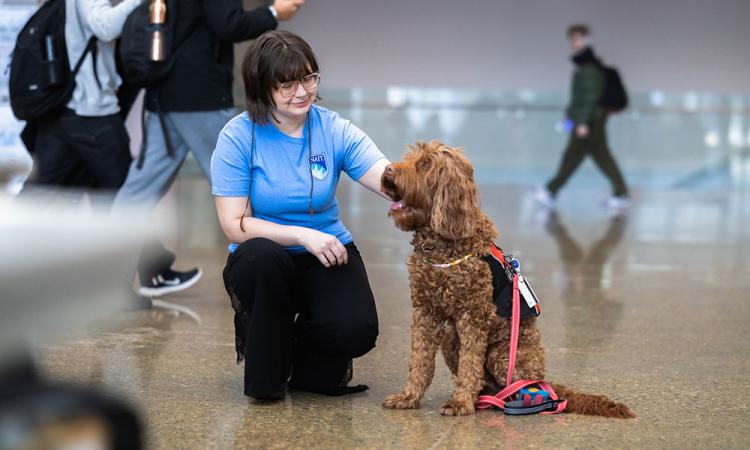Sometimes, it's an instructor's job to stress students out. That's particularly true in health-care training where simulations can be the main approach to learning.
A group of NAIT staff are experts in generating that educational adrenaline rush. At the Centre for Advanced Simulation (CAMS), technicians recreate unfortunate, though artificial, scenes of patient distress by way of images, sounds and even smells. The scenarios help students see how they'll perform under pressure before the pressure is real, and find areas for improvement.
But a balance has to be struck for improvement to happen. CAMS research associate Efrem Violato says that if a student experiences too much stress, "it's going to impair their learning." A post-simulation debrief, for example, is lost on a student who's unable to calm down.
That's where the process goes to the dogs - to the benefit of students and instructors alike.
In a recent paper in the International Journal of Healthcare Simulation, Violato, simulation technologist Michele Edwards and counsellor Linda Shaw, demonstrated the positive impact of animal-assisted therapy on the well-being of students following the emotional intensity of a simulation.
Stress reduction is a common part of simulation education at NAIT. While it is often accomplished by focused breathing exercises, Edwards wondered if the introduction of a dog - at first her own, a mixed-breed named Riggs - might bring even greater benefit to students. After a pilot study showed promise, she and Violato asked Shaw, owner of NAIT's official therapy dog, a nine-year-old Australian labradoodle named Flynn, to help conduct a formal experiment in late 2023.
Forty-five Primary Care Paramedic, Animal Health and Respiratory Therapy students participated in the study. Following separate simulations tailored to each discipline, they scanned a QR code for a survey to rate feelings of stress, anxiety and more. After that, a random selection was directed to a room for breathing exercises while others joined Flynn in another room for petting and playing.
Two-and-a-half minutes later, both groups took the survey again.
"Based on the pilot study and existing literature, we did expect that there would be a positive effect," says Violato of time spent with Flynn. And that's how playing with the dog played out in the results: "Animal-assisted intervention reduced anxiety to a greater extent."
The data supports the case for Flynn to be a fixture at simulations - and not just at the end. Students can experience anxiety at orientations before events, says Violato, suggesting that there may be value in bookending exercises with assisted therapy. What's more, he sees no reason that other post-secondary institutes, many of which also have resident canines, couldn't do the same.
"If this can work here then it can work almost anywhere else that's running simulations," says Violato.

Image: Leigh Kovesy
Ultimately, the three researchers hope the benefits of animal-assisted therapy extend beyond the students. Positioning them for success in school, by ensuring that they can learn effectively even during its most stressful times, prepares them for success in the field.
"The better we can educate students here, the better that patient outcomes will be."
If the researchers could have improved upon their self-funded study, it would have been to involve more participants to generate a more robust dataset. Also, while all students were excited to participate, those who were assigned breathing exercises post-simulation "expressed some disappointment," says Violato, which possibly affected outcomes.
But once the data was collected, and the hypothesis nonetheless validated, the "disappointed" group was rewarded with a chance to destress even further, this time with a furry friend. "They were able to play with the dog after the study was concluded," Violato assures.
Where can you find Flynn?
Flynn, NAIT's therapy dog, makes his way across campuses throughout the academic year to help improve the mental well-being of students and staff. For more information, reach out to Student Counselling.













